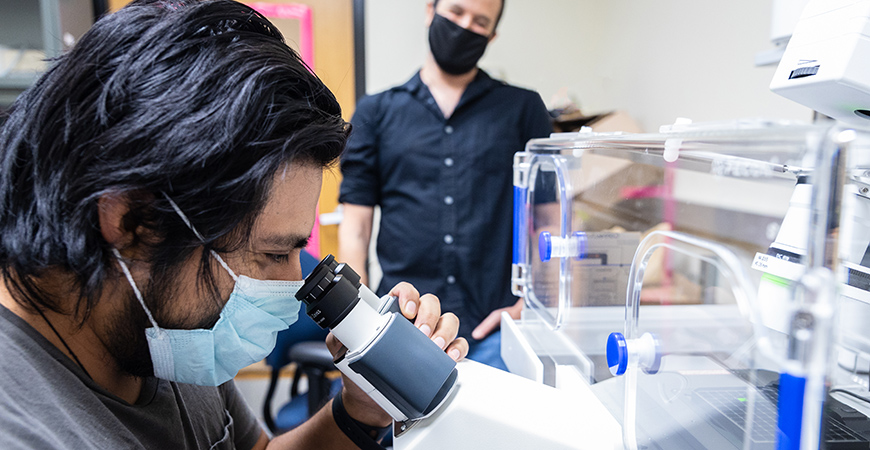
A five-year, $2.2 million training grant from the National Institutes of Health (NIH) will assist UC Merced with the development of diverse cohorts of doctoral students in interdisciplinary biomedical disciplines.
Twelve trainees each academic year will benefit from NIH’s longstanding Graduate Research Training Initiative for Student Enhancement Program, or G-RISE.
The goal of UC Merced’s G-RISE program, called I-BioSTeP (short for Interdisciplinary Biomedical Science and Technology) is to produce highly trained workers in biomedical research to help identify and solve pressing biological problems. Learning quantitative interdisciplinary approaches will help prepare students for competitive careers in the biomedical field.
The award is led by professors Ajay Gopinathan, Andy LiWang and Victor Muñoz from the departments of Physics, Chemistry and Chemical Biology and Bioengineering, respectively. All three are also part of the NSF CREST Center for Cellular and Biomolecular Machines (CCBM) which is co-directed by Muñoz and Gopinathan.
“We have expertise and an interdisciplinary synergy between physical sciences, engineering and biology, especially through the CCBM, and that’s unique to our campus,” said Gopinathan. “Through the center, we have a hub of activity with researchers from physics, chemistry, bioengineering, materials science and engineering, biology and applied mathematics all coming together to work on the same kinds of problems.”
I-BioSTeP trainees will receive coordinated, innovative and rigorous training in interdisciplinary research techniques including imaging and computing, as well as professional and career development for two years.
“The future of cutting-edge research in these areas is not a purely disciplinary kind of research; you need to be able to cross disciplines in order to make these kinds of fundamental advances,” Gopinathan said. “This training program specifically speaks to that in trying to remove any barriers for our students.”
A group of 30 program faculty members, spanning six graduate groups including Physics, Chemistry, Bioengineering, Materials and Biomaterials Science and Engineering, Applied Mathematics and Quantitative and Systems Biology, will be available to serve as mentors to students who are recruited into this program.
“To carry out cutting-edge research, you need well-trained students; it's the training of the students that’s critical and that’s what this program will provide,” LiWang said. “Hopefully, this will help get UC Merced one step closer to R1 research status.”
I-BioSTeP launches this fall with six incoming doctoral students who were selected from nominations from the participating graduate programs. A more coordinated effort with the graduate groups will start during the next recruitment season.
Gopinathan said they are looking for several things in trainees: training and academic background, research experience and potential, and programmatic fit or aptitude for performing interdisciplinary research and team science.
“Finally, and very importantly, are contributions to diversity,” he said. “A major goal for the project is to increase the diversity of the biomedical research workforce.”
Trainees will start research rotations in the fall of year one, each with a faculty mentor, and another in the spring with a different mentor to help them find the best fit.
From the start, I-BioSTeP trainees will be integrated into Graduate Division’s Competitive Edge Summer Bridge program.
“The idea is to make them feel like a cohort early on and have them working collectively even though they are coming from six different programs,” Muñoz said. “The students can start full throttle in the beginning and become integrated quickly.”
During the first year, they'll attend one-week workshops on imaging and spectroscopy, computation and modeling, and molecular biological biotechnology to give them a foundation and hands-on experience. They will also attend bi-monthly professional development workshops.
By their second year, trainees will have picked a pair of research advisors and a thesis project. They will attend three I-BioSTeP courses that parallel the first year’s workshops and choose from one of three career development tracks — business and consulting, science communications or teaching.
Opening a training program for the highly skilled biomedical research workforce of tomorrow at UC Merced will have an enormous impact on the region, both educationally and economically.
The Office of Research and Economic Development will lead activities for the business and consulting track, the Center for Engaged Teaching and Learning will lead activities for the teaching track and chemistry Professor Ryan Baxter and CCBM Executive Director Carrie Kouadio will lead activities for the science communications track.
“We are thrilled for the team to receive this impressive NIH training grant for the campus and graduate education,” interim Vice Chancellor of Research and Economic Development Marjorie Zatz said. “Opening a training program for the highly skilled biomedical research workforce of tomorrow at UC Merced will have an enormous impact on the region, both educationally and economically.”
To get the word out about the program, Muñoz said they’ll focus on reaching out to contacts at other institutions and attending conferences, virtually for now, to help cast a wide net.
“We are looking for students from different backgrounds from the point of view of their personal history, but also from the point of view of their academic training,” he said. “We will feature the possibilities of the program, which we think is going to be very attractive because we can support students for two years.”
Through the grant, NIH covers the entire yearly stipend as well as travel and 60 percent of each students’ tuition and fees. The remaining 40 percent is covered equally by Graduate Division and each trainee’s graduate group.
“Graduate students play a critical role in keeping UC Merced’s research on the cutting edge, and stable funding plays a critical role in Ph.D. students’ academic progress,” interim Vice Provost and Graduate Dean Chris Kello said. “The I-BioSTeP training will put them in an excellent position at the end of two years for other fellowship opportunities, both internal and external, as well as make a huge difference when they graduate and go forward into the biomedical workforce.”
Brenda Ortiz

Senior Public Information Representative
Office: (209) 228-4203
Mobile: (209) 628-8263






